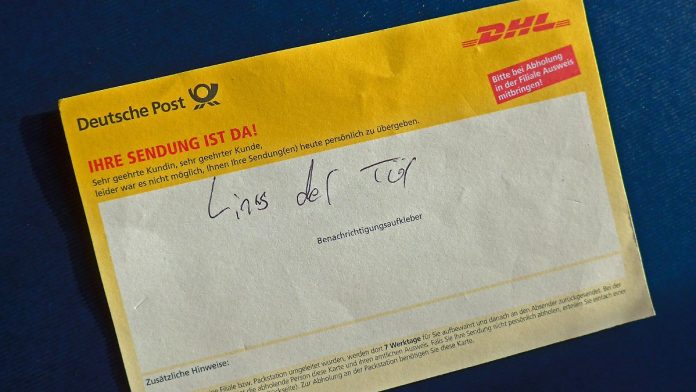“Is a win-win situation”
Parcels are more and more often in front of the front door
Since the beginning of the pandemic, alternative forms of parcel delivery have enjoyed increasing popularity. DHL delivers around 40 million shipments to recipients’ front doors every month. This has advantages for both parties. However, with the filing OK, the liability of the parcel deliverer is also eliminated.
Parcel carriers are increasingly leaving their shipments in Germany on the doorstep of the recipient so that they can access them when they return. DPD states that the number of corresponding digital consents has skyrocketed with the corona pandemic, and the number has doubled from 2019 to 2022. At GLS, 220,000 parking permits were issued every month in 2020, and the figure has now reached up to 550,000. A Hermes spokeswoman reports that a six-digit number of customers use this function every day. “A storage location is booked for more and more shipments.” Further growth is expected here. The market leader DHL delivers 40 million shipments every month, and the trend is rising.
“In times of Corona, many people gave us parking permits to keep the risk of infection as low as possible,” says Michael Knaupe from DPD Germany. Fortunately, the pandemic is now over, but consumers have gotten used to the filing OK and have had good experiences with it. With the service, recipients agree before delivery that the parcel will be left in front of the door, on the terrace or in the garage. That’s good for the companies because it saves their deliverers time. “Thanks to the parking permit, the stopping time of a normal delivery of a parcel from parking to departure has been significantly reduced,” says the Head of Customer Experience at DPD Germany.
“Productivity of service providers increases”
From the point of view of the Frankfurt logistics professor Kai-Oliver Schocke, the increasing number of permits is a tailwind for the industry, which is receiving more and more shipments due to the booming online trade and at the same time is desperately looking for specialists in an empty job market. “This significantly increases the productivity of the service providers, after all their parcel carriers no longer have to wait for someone to finally open the door.”
The waiting time for the parcel carrier is associated with high costs for the companies, which can now be reduced. If a customer is not at home, he has several options to choose from. With DPD, he can specify that the courier should deposit the parcel at a parcel shop, with a neighbor, on another day or at a storage location – for example in front of the front door. It’s the same with other service providers, with DHL the Packstation function is added: The shipment is then taken to a parcel machine, where the customer later has round-the-clock access.
The Bonn group recently upgraded the storage location function. DHL now offers consumers to leave a package – such as a return – in front of their door and have the courier take it away when the consumer is not at home. The competition doesn’t do that. The storage ok is not a new invention, this function already existed in the offline age: Recipients could hang slips of paper on the door or the doorbell and thus give their consent to storage. With the digital age, this function has become a mass phenomenon that is of mutual benefit: the parcel service saves time and the customers find their shipment when they get home.
“It’s a win-win situation,” says DPD employee Knaupe. “Both sides have advantages.” A GLS spokeswoman says it is an “overriding goal to convince more and more customers of the possibility of a reassignment”. The term reassignment means an alternative to the time-consuming personal doorstep handover, i.e. sending it to a GLS parcel shop or the aforementioned parking permit.
Recipient bears liability risk
However, filing does not make sense everywhere. A Hermes spokeswoman says that it should be a freely accessible, safe and weather-protected place, such as a garage or carport. Staircases, for example, are not recommended because different people have access here. If the shipment is stolen or damaged while it is unattended at the storage location, the parcel company is released from liability. The consumer therefore bears a certain risk if he consents to the service. According to various parcel companies, it only happens in isolated cases that customers report that the parcel cannot be found.
Rapid parcel filing helps companies to improve on the “last mile” – i.e. on the last route to delivery. This part of the shipment process is particularly labour-intensive and also problematic from the point of view of climate protection, after all the distance traveled per parcel is longer than if a transporter only drives to a parcel shop or to a parcel machine and delivers a large number of shipments there in one go.
Ultimately, the service providers would prefer it if their vans no longer had to drive to the individual addresses, but instead the bulk shipments could be delivered in bundles – that would save distance and time. From the point of view of DPD employee Knaupe, the storage location is a small step towards parcel shipping without doorstep delivery: “In a next step, private consumers could be willing to forego delivery to the doorstep in the interests of climate protection and instead go and collect the parcel themselves .” The willingness to do this is growing, especially among the younger generation, says Knaupe. Therefore, the demand for the parking permit at home will decrease in the future and will become a premium product for which the recipient will pay in the future.


